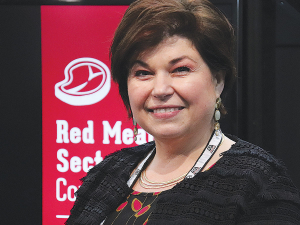NZ Red Meat Outlook 2026: Growth amid trade uncertainty
While things are looking positive for the red meat sector in 2026, volatility in global trade remains a concern, says the Meat Industry Association (MIA).
 MIA boss Sirma Karapeeva struggles to see how much more automation can be introduced into the meat industry to resolve the present labour shortages.
MIA boss Sirma Karapeeva struggles to see how much more automation can be introduced into the meat industry to resolve the present labour shortages.
Meat Industry Association (MIA) boss Sirma Karapeeva says she struggles to see how much more automation can be introduced into the meat industry to resolve the present labour shortages.
Karapeeva says many people seem to think that automation is the silver bullet that can compensate for labour shortages in the industry caused by the Covid-19 pandemic.
"I struggle to see how that is possible. In the red meat sector, we have already done all that we can do in terms of the lower hanging fruit in automation," she told Rural News.
"The big pieces of automation are already in place and the next areas of automation that could be developed are really challenging because you are dealing with the natural product - meat."
Karapeeva says while it's possible to cut out a widget based on a computer program, it is much more complicated to get a computer to cut a product such as meat. She says there may be an opportunity in the future, but at the moment the industry is having to focus on the immediate labour shortages and can't buy into the idea of further automation.
She also notes that innovation and automation are often confused, but in fact they are quite different things, with innovation often related to streamlining business processes within a company.
The issue that worries Karapeeva the most is that of labour shortages. She says this is the number one issue for the meat industry and she's grateful that the Government has rolled over the current visas for overseas workers for the next two years, which means that the crisis is not so imminent.
"But the idea of rolling over visas is not sustainable and does not give the companies the certainty to plan their production cycles," she adds. "We want to sit down with the Government and find a sustainable, long term solution that will give us certainty and will allow companies to plan."
Karapeeva points out that if the industry is unable to recruit halal slaughterers from overseas, it will devalue the carcass of the animal, impact on company profitability, reduce the value of NZ exports and affect returns to farmers.
Agrisea NZ has appointed Craig Hudson as it's new chief growth officer.
State farmer Landcorp, trading as Pamu, is a forecasting a full-year net profit of around $100 million.
Tony Aitken, chief executive of Ruralco, has been awarded the Excellence in Business Leadership Award at the ANZ Business of the Year Awards.
Global trade has been thrown into another bout of uncertainty following the overnight ruling by US Supreme Court, striking down President Donald Trump's decision to impose additional tariffs on trading partners.
Controls on the movement of fruit and vegetables in the Auckland suburb of Mt Roskill have been lifted.
Fonterra farmer shareholders and unit holders are in line for another payment in April.

OPINION: Here w go: the election date is set for November 7 and the politicians are out of the gate…
OPINION: ECan data was released a few days ago showing Canterbury farmers have made “giant strides on environmental performance”.